大学英语第二册第二单元单词
大学英语精读第二册_Unit2单词

have…in common,意为“与…有共同之处”,共享。 e.g. 1. The twins have a lot in common. (这对双胞胎有许多共同之处。) 2. I haven’t a thing in common with my father. (我与我父亲没有任何共同点。) have与 in common搭配,之间可以加表示程度的词, 以指明共同点的多少:have little in common 没有 什么共同之处;have sth. In common有共同之处; have nothing in common 毫无共同之处
e.g. 1.
You must have drunk somewhere. Your breath smells of wine. (你肯定在哪里喝过酒,你呼出的有酒味。) 2. My hands smell of fish. (我手上有鱼腥味。) 另外,have a smell of… 有…的意味
e.g. 1.
They answered the teacher’s questions in turn. (他们轮流回答老师的问题。) 2. I shall hear you all in turn. (我一个个地听你们说。)
last straw= the difficulty, trouble, etc. that makes the total unbearable when it is added to one’s present difficulties or troubles (from the story in which the last straw broke the laden camel’s back) (在现有苦难之外增加的)叫人再也无法忍受的困难或 苦难等(源于“最后一根稻草压断了骆驼背”的故事)
全新版大学英语第二册单词表

a.确信的;有益的,建设性的
与...有关(几乎无关,很有关系)
得到心中渴望的东西
不费吹灰之力的事情
n.女英雄
a.世故的;老练的;复杂的;尖端的
vi.变弱;犹豫
更换(工作,话题等)
n.投资
全新版大学英语第二册单词第
n.杂乱状况
a.大量的,大规模的
n.词汇(量)
n.快餐,点心
n.游行;阅兵队列
n.殉难者,烈士
n.增加的人(或物)
a.诺曼人(的),诺曼语(的),诺曼文化的
v.征服
a.国王(般)的
a.国王或女王的;皇家的
a.拥有最高统治权的,至高无上的;拥有主权的
n.供选择的东西
vt.修改,更改
vt.使富裕,使丰富
n.(欧洲14-16世纪的)文艺复兴
n.经典作品
n.密封小容器;胶囊;航天舱
a.惯常的
ad.(口语)是
vi.褪色;变暗淡;消失
ad.片刻
ad.大体上;
用一物交换另一物
n.悬念
使产生悬念,故意迟迟不告诉
vt.打断...的讲话;中断...的行动
vt.敢说;确信
vt.转移(注意力);使分心
ad.同时地
a.同时的
n.(高中或大学等的)班级舞会
int.哎约
vt.咬紧,握紧
n.(语调、色彩等的)单调
伸展
n.微风,清风
vt.使聋
a.耳聋的
vi.疾跑
n.起跳;起飞
a.容易的,不费力的
n.爆发
vi.爆发
n.重击声
使回到现实中
在想象中
vt.祝贺
n.大众传播媒体
n.资助
大学英语精读第二册Unit2单词
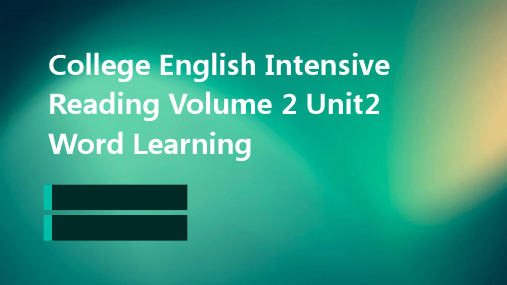
preposition
preposition
a word that shows the relationship between a noun or pronoun and another word in the sentence.
examples
"in", "on", "by", "with", "about"
总结词
通过词根和词缀记忆单词
详细描述
学习者通过学习单词的词根和词缀,理解单词的构成和含义。这种方法有助于学习者快 速记忆大量单词,并提高单词拼写的准确性。
Associative memory method
总结词
通过联想记忆单词
详细描述
学习者通过将单词与相关的图像、故事、场 景等联系起来,形成深刻的印象。这种方法 有助于学习者更长久地记忆单词,并提高记 忆的趣味性。
The Application of Words in Writing Expression
• Vocabulary and Grammar: Understanding words allows students to use a wider variety of vocabulary and grammar in their writing. This helps to create more expressive and coherent texts. For example, using the word "fascinating" instead of "interesting" can add depth and drama to a sentence.
新课标大学英语 第二册 u2 单词
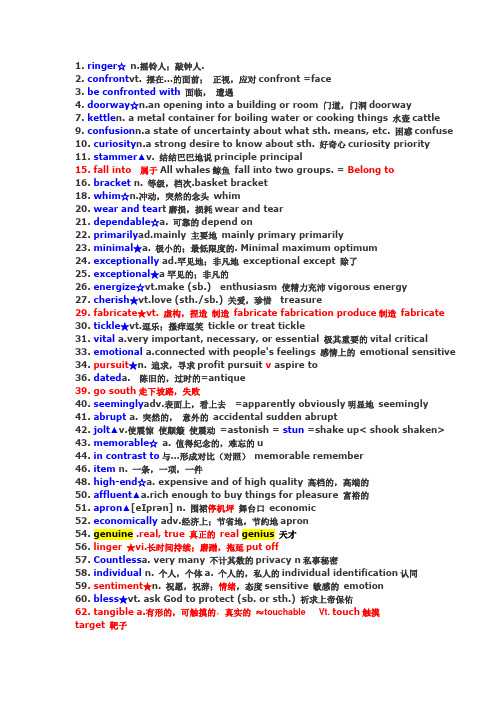
1. ringer☆n.摇铃人;敲钟人.2. confront vt. 摆在…的面前;正视,应对confront =face3. be confronted with 面临,遭遇4. doorway☆n.an opening into a building or room 门道,门洞doorway7. kettle n. a metal container for boiling water or cooking things 水壶cattle9. confusion n.a state of uncertainty about what sth. means, etc. 困惑confuse10. curiosity n.a strong desire to know about sth. 好奇心curiosity priority11. stammer▲v. 结结巴巴地说principle principal15. fall into 属于All whales鲸鱼fall into two groups. = Belong to16. bracket n. 等级,档次.basket bracket18. whim☆n.冲动,突然的念头whim20. wear and tear t磨损,损耗wear and tear21. dependable☆a. 可靠的depend on22. primarily ad.mainly 主要地mainly primary primarily23. minimal★a. 极小的;最低限度的. Minimal maximum optimum24. exceptionally ad.罕见地;非凡地exceptional except 除了25. exceptional★a罕见的;非凡的26. energize☆vt.make (sb.) enthusiasm 使精力充沛vigorous energy27. cherish★vt.love (sth./sb.) 关爱,珍惜treasure29. fabricate★vt. 虚构,捏造制造fabricate fabrication produce制造fabricate30. tickle★vt.逗乐;搔痒逗笑tickle or treat tickle31. vital a.very important, necessary, or essential 极其重要的vital critical33. emotional a.connected with people's feelings 感情上的emotional sensitive34. pursuit★n. 追求,寻求profit pursuit v aspire to36. dated a. 陈旧的,过时的=antique39. go south走下坡路,失败40. seemingly adv.表面上,看上去=apparently obviously明显地seemingly41. abrupt a. 突然的,意外的accidental sudden abrupt42. jolt▲v.使震惊使颠簸使震动=astonish = stun =shake up< shook shaken>43. memorable☆a. 值得纪念的,难忘的u44. in contrast to与…形成对比(对照)memorable remember46. item n. 一条,一项,一件48. high-end☆a. expensive and of high quality 高档的,高端的50. affluent▲a.rich enough to buy things for pleasure 富裕的51. apron▲[eIprən] n. 围裙停机坪舞台口economic52. economically adv.经济上;节省地,节约地apron54. genuine .real, true 真正的real genius 天才56. linger ★vi.长时间持续;磨蹭,拖延put off57. Countless a. very many 不计其数的privacy n私事秘密58. individual n. 个人,个体a. 个人的,私人的individual identification认同59. sentiment★n. 祝愿,祝辞;情绪,态度sensitive 敏感的emotion60. bless★vt. ask God to protect (sb. or sth.) 祈求上帝保佑62. tangible a.有形的,可触摸的,真实的≈touchable Vt. touch触摸target 靶子1. mansion n.豪宅,大厦2. dime▲n. 10分硬币buck 1美元3. discount n.a reduction 折扣account 账目理由accountant 会计4. billionaire★n.亿万富翁;大富翁millionaire 百万富翁5. folk n. (usu. pl.) people in general 人们generous 慷慨folk8. corporate a. corporate 大公司的cooperation合作n corporation9. memo▲n.a note of sth. to be remembered 备忘录memory 记忆10. mayor n.市长总是说may的人是市长memorable 难忘的11. by / from all accounts according to what people say 根据各方面的说法12. blend v . mix together 混合blend13. blend in mix harmoniously (with)(与…)打成一片14. throw one's weight around(informal 非正式的) 盛气凌人15. barber n.理发师barber 爸爸是理发师18. celebrity★名人celebration n庆典auxiliary agriculture20. steer clear of keep away from 避开,避免opinion opportune 恰当的opportunity 机会anniversary steal clear of opportunity21. rank 排名liable alphabet23. rally n. a large, usu. political public meeting 大会,集会r all y24. Liable a. be liable to do 可能,会有倾向的记忆音似:来able25. lay down规定establish (sth.) as a rule or principle lay out 排版26. loyalty n.the quality of being true and faithful 忠诚loyal忠诚的28. on board 加入,是…一员board 甲板上(飞机船车)29. court n.球场法院lawyer = attorney律师30. cultivate vt培养= foster culture V t培养generous33. generosity n. kindness , esp. in giving things to people 慷慨,大方35. come into contact (with)communicate with; touch 与…接触contractor 承包商contact使接触接触+withWheel 轮子loyalty whale 鲸鱼Glory N 荣耀glory company accompanySplendid adj.壮观的,豪华的;极好的或令人满意的;闪亮的;为众人所推崇的Honor n.荣誉,光荣;尊重;名誉,面子;节操Loyal adj. 忠诚的Proof evidence证据proof evidence honor splendidConquer conquest。
新视野大学英语第二册第二版第二单元单词详解
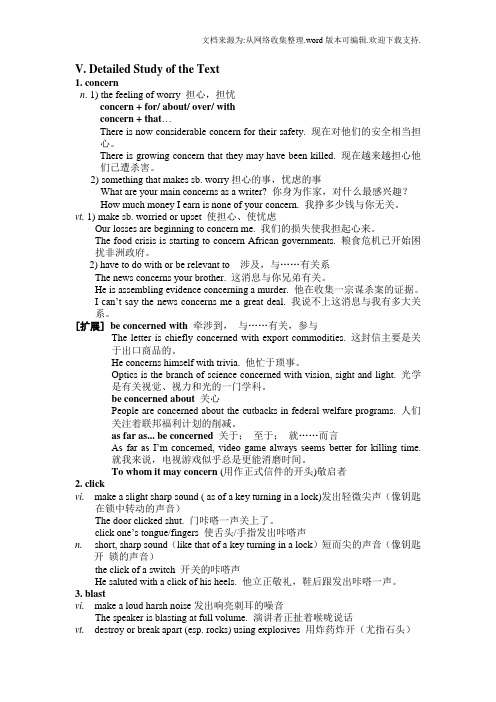
V. Detailed Study of the Text1. concernn. 1) the feeling of worry 担心,担忧concern + for/ about/ over/ withconcern + that…There is now considerable concern for their safety. 现在对他们的安全相当担心。
There is growing concern that they may have been killed. 现在越来越担心他们已遭杀害。
2) something that makes sb. worry担心的事,忧虑的事What are your main concerns as a writer? 你身为作家,对什么最感兴趣?How much money I earn is none of your concern. 我挣多少钱与你无关。
vt. 1) make sb. worried or upset 使担心、使忧虑Our losses are beginning to concern me. 我们的损失使我担起心来。
The food crisis is starting to concern African governments. 粮食危机已开始困扰非洲政府。
2) have to do with or be relevant to 涉及,与……有关系The news concerns your brother. 这消息与你兄弟有关。
He is assembling evidence concerning a murder. 他在收集一宗谋杀案的证据。
I can’t s ay the news concerns me a great deal. 我说不上这消息与我有多大关系。
[扩展] be concerned with牵涉到,与……有关,参与The letter is chiefly concerned with export commodities. 这封信主要是关于出口商品的。
新视野大学英语2unit2单词课文
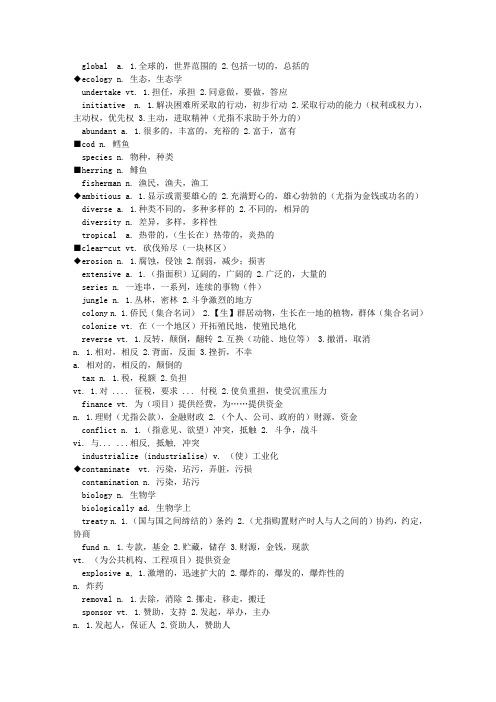
global a. 1.全球的,世界范围的 2.包括一切的,总括的◆ecology n. 生态,生态学undertake vt. 1.担任,承担 2.同意做,要做,答应initiative n. 1.解决困难所采取的行动,初步行动 2.采取行动的能力(权利或权力),主动权,优先权 3.主动,进取精神(尤指不求助于外力的)abundant a. 1.很多的,丰富的,充裕的 2.富于,富有■cod n. 鳕鱼species n. 物种,种类■herring n. 鲱鱼fisherman n. 渔民,渔夫,渔工◆ambitious a. 1.显示或需要雄心的 2.充满野心的,雄心勃勃的(尤指为金钱或功名的)diverse a. 1.种类不同的,多种多样的 2.不同的,相异的diversity n. 差异,多样,多样性tropical a. 热带的,(生长在)热带的,炎热的■clear-cut vt. 砍伐殆尽(一块林区)◆erosion n. 1.腐蚀,侵蚀 2.削弱,减少;损害extensive a. 1.(指面积)辽阔的,广阔的 2.广泛的,大量的series n. 一连串,一系列,连续的事物(件)jungle n. 1.丛林,密林 2.斗争激烈的地方colony n. 1.侨民(集合名词) 2.【生】群居动物,生长在一地的植物,群体(集合名词)colonize vt. 在(一个地区)开拓殖民地,使殖民地化reverse vt. 1.反转,颠倒,翻转 2.互换(功能、地位等) 3.撤消,取消n. 1.相对,相反 2.背面,反面 3.挫折,不幸a. 相对的,相反的,颠倒的tax n. 1.税,税额 2.负担vt. 1.对 .... 征税,要求 ... 付税 2.使负重担,使受沉重压力finance vt. 为(项目)提供经费,为……提供资金n. 1.理财(尤指公款),金融财政 2.(个人、公司、政府的)财源,资金conflict n. 1.(指意见、欲望)冲突,抵触 2. 斗争,战斗vi. 与... ...相反, 抵触, 冲突industrialize (industrialise) v. (使)工业化◆contaminate vt. 污染,玷污,弄脏,污损contamination n. 污染,玷污biology n. 生物学biologically ad. 生物学上treaty n. 1.(国与国之间缔结的)条约 2.(尤指购置财产时人与人之间的)协约,约定,协商fund n. 1.专款,基金 2.贮藏,储存 3.财源,金钱,现款vt. (为公共机构、工程项目)提供资金explosive a, 1.激增的,迅速扩大的 2.爆炸的,爆发的,爆炸性的n. 炸药removal n. 1.去除,消除 2.挪走,移走,搬迁sponsor vt. 1.赞助,支持 2.发起,举办,主办n. 1.发起人,保证人 2.资助人,赞助人cash n. 现钞vt. 兑换现金,兑现■cassava n. [C] 木薯■maize n. [U] 玉蜀黍,玉米generate vt. 1.生成,产生(光、热、电等) 2.引起,产生regenerate vt. 重建,复兴,革新observer n. 观察家,观察的人,观察员strengthen vt. 使坚强,使强壮,加固,巩固,加强,增强impact n. 1.对... ...的强烈的印象或影响 2.碰撞,撞击v. 1.影响,作用 2.碰撞,撞击frown v. 1.不赞成,反对 2.2. 皱眉,蹙额n. [C] 皱眉shelter n. 1.住所,住处 2.掩蔽部,掩蔽处,躲避处 3.掩蔽,遮蔽,保护vt. 掩蔽,遮蔽,庇护vi. 躲难,避难wage vt. 发起,进行(战争、运动等)n. 工资,报酬(通常按周计酬)massive a. 1.大量的,大规模的 2.大的,大而重的,大块的ad n. 广告◆induce vt. 1.引诱,诱导 2.导致,引起inducement n. 诱因,引诱物,动机convert v. 1.(使)改变(信仰或态度等) 2.改变,转变target n. 1.(欲达到的)目标,指标 2.标的,靶vt. 把... ...作为目标Phrases and Expressionsconcern with 忙于,从事,关心regardless of 不顾,不管spring up 迅速或突然的出现,发生,长出take measures to 采取措施,采取办法as a result of 因... ...aim at 意欲或试图做agree to 同意,允诺,赞成set up 建立,创立lead to 导致cash crop 经济作物birth control 节育vacant a. 1.未被占用的,空着的 2.(职位、工作等)空缺的 3.茫然的,空虚的rare a. 1.稀有的,罕见的;冷僻的 2.稀罕的,珍奇的option n. 1.供选择的事物,可选择的事物;选择 2.选择权,选择自由,选择enormous a. 巨大的,庞大的,极大的private a. 1.私人的,个人的,私用的,私有的 2.秘密的,私下的 3.私营的,私立的,非国家控制的ownership n. 物主身份,拥有(权)◆literally ad. 照字义,逐字地,真正地urban a. 都市的,位于都市的,住在都市的◆pave vt. 给(道路路面)铺上石板或砖mud n. 湿泥,泥childhood n. 童年时期,孩提时代bulb n. 1.[C] 长在土里的植物球茎(如百合、洋葱、郁金香等植物) 2. [C]电灯泡container n. 容器(箱、瓶等)amateur a. 业余的,非专业的n. (指不为赚钱而从事体育或艺术的)业余爱好者gardener n. (因爱好或挣钱) 在花园从事劳动的人,园丁pea n. [C] 豌豆,豌豆属植物salad n. 1. [U] 适于生吃的莴笋、莴苣或其他蔬菜 2. [C, U] 沙拉(凉拌菜),生菜costly a. 昂贵的,代价高的ditch n. (在田边、路边挖的,尤指用来储水或排水的)沟,渠道lorry n. [C] 卡车erect vt. 1.建造,建立,竖立 2.树立,直立a. 竖直的,挺直的,直立的mister n. (略作Mr. 全称很少用于书面)先生vice a. 代理的,副的nineteen num. 十九,十九个conservation n. 保护,保存, 节省trail n. 1.小道,崎岖小路 2.踪迹,痕迹v. 1.拖,拉,下垂 2.(在比赛中)落后,失利vt. 追踪,尾随characterize (英characterise) vt. 1.成为... ...的特征,以... ...为特征 2.描绘(人或物的)特征,归纳(人或物的)特征housing n. 1.住宅或公寓,住宿(集合名词) 2.提供住宿,住房供给recreation n. 休养,娱乐,消遣,精神放松acre n. 英亩(=4,840平方码或约4,047平方米)canal n. 运河,沟渠excursion n. 短途旅行,远足comparable a. 1.相似的,同类的 2.可比的,比得上的strip n. 狭长的一块(材料)或一片(土地)vi. 脱去衣服vt. 1.剥去,揭去,除去(衣服、遮蔽物、某部分) 2.剥夺... ...的(钱财、荣誉等)summit n. 1.最高点,(尤指山的)顶,绝顶 2.两国或两国以上(尤指世界上最强的国家)政府首脑的最高级会谈plot n. 1.(尤指用于某特定目的) 小块土地, 小块地皮 2.(戏剧或小说的故事)情节 3.秘密计划,阴谋v. 密谋,计划civilian n. 平民Phrases and Expressionsopen field 旷野in fact 事实上,实际上on top of 在... ...之上work on 致力于power line 【电】电力线,输电线,电源线coordinate one's efforts to 齐心协力clean up 清扫,收拾,清理up to 多达,直到for instance 例如wash away (指水)洗掉,冲走lead into 通往,通向Environmental Protection Throughout the WorldIntroductionIn most parts of the world, environmental awareness does not exist. The great majority of nations concern themselves with economic development, regardless of its effect on the global ecology. But in recent years, as environmental damage has increased, signs of change have sprung up in various pockets around the world. The following are a few examples of countries undertaking new environmental initiatives.CanadaWhen European explorers first came to the New World, the fishing grounds off what would become eastern Canada and New England held abundant cod and other species. The area, called the Grand Banks, was the most abundant fishing ground in the world.Now, 500 years later, excessive fishing has reduced the number of fish to dangerously low levels. In response, Canada has closed the area to cod fishing and set strict limits on catches of other species.When Canada took similar measures to protect the supply of herring in the 1970s, the fish eventually recovered. But experts say that some species today have been so wasted, they may never recover. The government also faces protests from Canadian fishermen. About 40,000 are now unemployed as a result of the fishing bans and lossof their fish supply.Costa RicaThis Central American country has one of the most ambitious programs in the world to reserve the ecological diversity of its tropical rain forests. Much of the country has already been clear-cut, and soil erosion has been extensive. But a series of new environmental laws, together with the creation of parks and nature preserves that cover one quarter of the country, are aimed at protecting Costa Rica’s remaining forests.BrazilBrazil is home to the world’s largest jungle rain forest, the Amazon. For decades, the government sought to colonize and develop the Amazon, bringing severe environmental disaster to the area and its people.But in 1991, under pressure from environmentalists around the world, Brazil reversed course. It ended tax favors that had encouraged clearing of the Amazon rain forest, and agreed to a plan to finance new forest protection projects.Cattle farmers, miners, and settlers have protested the move and continue to destroy the forests, although at a slower pace than before. The conflict enlarged last year when miners killed a group of Amazon Indians in order to seize their land. The government promises it will protect the region’s native people, but questions remain as to its true level of commitment.Eastern EuropeThe nations of Eastern Europe, including Poland, Hungary, and the Czech and Slovak Republics, are considered the most polluted of all the world’s industrialized countries. Heavy metals from coal mining have contaminated much of the area’s waters. Rivers, land, and forests are so contaminated that many are now biologically dead.In a special series of treaties, Eastern European countries and other nations, including the United States, have set up special funds for environmental cleanups and improving the region’s power plants. In addition, Germany and the Czech Republic have signed a treaty to protect the Elbe River from further contamination. Experts say the treaty could serve as a model for protecting other rivers in the region, including the Oder and Danube.GhanaGhana’s population has been growing by 3.2 percent a year. This explosive growthhas led to removal of forests in much of the country, and excessive use of existing farmland. Forests have been cut down at the rate of 278 square miles a year.In response, the government has urged local villages to create more shared farmland. It has sponsored the growing of cash crops such as cassava, maize, cotton, and the planting of trees to regenerate waste land. Observers say the program has succeeded in strengthening the country’s agricultural base and bringing a new source of wealth to villagers. But it remains to be seen whether these measures will have enough impact to slow the rate of removing the forests.IndonesiaIndonesians have traditionally favored large families, and their major religion, Islam, frowns on birth control. But with 188 million people, the country is now struggling to provide enough food, shelter, and employment for its people. In recent years, the government has waged a massive ad campaign to encourage birth control, offering inducements such as free trips to Mecca, the birthplace of Islam in Saudi Arabia.The government has succeeded in increasing use of birth control from 10 percent of the population 20 years ago to 49 percent today. As a result, the average number of births has been cut from 5.6 children per woman to 3. The government hopes to reduce this average to 2.1 children per woman by 2005. But with such a large population base, the country must still convert millions more to the idea of birth control if it is to reach its population targets.Words: 796Green Spaces in CitiesWhere do children play? Years ago, any open field, any vacant lot, any group of trees -- these were the places where children played. As families left family farms, small towns, and the countryside, and moved into cities, the places for their children to play in became rarer. Children in the cities had few options, fewer choices of places to play.In fact, all people's lives change a lot when they move to the city. In cities, homes are built on top of one another -- in enormous apartment buildings. The feeling of private space and ownership no longer exists in houses literally piled one on the other.Psychologists have been studying the changes people experience when they leave rural areas and move into urban environments. One clear finding from their studies is that people need green spaces for better mental health. Children can play on paved playgrounds. That's true. However, they just don't have as much fun as children in small towns. Without grass and trees and bushes and, yes, dirt and mud to get dirty in, children miss an important part of childhood. The human soul, it seems, needs to stay close to its roots.Adults can plant lots of things like bulbs in window boxes and large containers. However, tending window boxes isn't the same as being an amateur gardener and growing peas, tomatoes and salad greens in a backyard garden. The lack of green space is now recognized and understood as a problem.City planners -- the people who design neighborhoods -- have begun to work on a solution. They want to build more parks, but land in cities is quite costly. So they look for land that no one else wants. Along rivers, under power lines, near ditches and highways -- these are the spaces that no one uses and they are everywhere. Why not use these unused spaces for green areas? Neighborhood groups have coordinated their efforts to clean up the trash or garbage. Soil from new building projects in the city has been trucked by lorries into these areas. This soil has been dumped along the sides of rivers, and strong walls have been erected to hold it there. Trees and bushes have been planted; the roots of these plants will hold the soil, too, and the green leaves make the area beautiful."People in and near cities have little opportunity to experience parks or unprotected open spaces, and that's becoming a problem," says Mister Ernest Cook, a senior vice president of the Trust for Public Land (TPL). This organization was started over twenty-one years ago. Its purpose is to protect land and public resources for people. In the past nineteen years, TPL has completed up to a thousand conservation projects in Canada and the United States.In Portland, Maine, the land along the old train tracks near the coast has become a green belt of trails between areas characterized by housing developments and those characterized by downtown businesses. To Mister Charles Jordan, the director of the Portland Parks and Recreation Department, it's just a beginning. Jordan has plans for an environmental university -- a huge urban park (5,000 acres ). It will include different environments, from canals and wetlands to forests. Jordan's plans include a network of trails and paths for people to use for excursions all over the city. He also wants to build a green belt from Portland, across Canada and the United States, all the way back to the Pacific Ocean. Communities across the continent could be connected by such a green belt.Other cities have comparable projects. In Phoenix, Arizona, for instance, the sides of the Salt River bed that have washed away are becoming a park. In Baltimore,a long strip of land (which was used for dumping garbage) is becoming a series of biking and walking trails. These trails will link a dozen neighborhoods and the downtown business areas. In some cities, the bicycle paths connect every area to every other area. In Flagstaff, Arizona, a thousand miles of bike trails lead into the San Francisco Peaks, the highest summit in the state.In other areas, planners have made places for bicycle trails and playgrounds, for public gardens and private garden plots, and paths for walking and running excursions. The costly result is a growing greenness in the cities and a healthier environment for all the civilians who live there.Words: 730Earth — a Living PlanetEarth looks like a big blue marble (玻璃球); from high above the Earth and from the moon, the planet gleams and shines. The blue water in the oceans and seas of the Earth makes a dramatic image. The white clouds above the Earth add beauty to the picture. Water is the source of this beauty and the source of life on Earth. It is the reason people can live on this planet. Water is everywhere. It is in the air that people breathe. It is in the soil, the ground that grows the food. Water is in rock deep under the ground, in natural holding areas -- in storage. In a real sense, water keeps Earth alive.Nature has an unchanging amount of water. Nature has a perfect system for recycling water. Water is used again and again. It falls as rain. Then it goes to one of three places. It might sink slowly through the soil into the natural holding areas in the rock. It might disappear into the air quickly -- by becoming vapor, or gas. It might run off into streams, rivers and oceans. By itself, nature can keep the balance and provide plenty of clean water for us. Nature recycles water.However, people cause problems for this natural recycling system. Nature's recycling system can work well only if people work with the system and not against it. Some ways that people upset nature are easy to understand. For example, dirty sewage (污水沟系统) water from homes and factories must not mix with drinking water. People get sick from drinking contaminated water. Sometimes water from factories goes into streams and rivers. It enters into the groundwater. It can flow into lakes too. This kind of contamination from industry (waste water from factories) can be dangerous for people. If water contains poisons and chemicals, it is poison. Poison makes people sick; some poisons kill people as well as birds and animals. Without knowing, people can upset nature's recycling system.Lakes and rivers add beauty to the world. People enjoy water for entertainment purposes, too. People enjoy swimming and playing in the cool water of a lake in the summer. They like to ride on boats on rivers. Many people enjoy catching fish in the rivers. They fish for food and for sport. However, in some places, the water of the lakes and rivers is no longer safe. These rivers and lakes are contaminated. The fish are dying because of the chemicals from farms and factories. People cannot swim in the polluted water.There are other ways that people disturb nature. Some of these ways are not easy to understand. For example, of what use is a wet land? No one can plant crops on it. No one can build a house on it. Therefore, engineers have removed the water from some wet-lands in order to make useful land. Many shopping centers stand on dry land today, land that was once wet and full of marshes. Yet the soft and wet ground of a marsh serves an important purpose in nature. In a marsh, the surface water can sink slowly down through the soil into the rock below. Nature's holding area fills slowly with that clean, filtered water.Housing developments and shopping centers cover much of the Earth with paved and concrete surfaces. Water cannot sink through these hard surfaces. Rainwater cannot sink into the ground because of the buildings, roads, and parking lots. So it floods parking lots and flows into basements. Engineers build huge storm pipes or sewers (污水沟) to carry the storm water away, but these cause another problem. They carry all of the water away. Not much water can sink into the holding areas under the ground. The once unlimited supply of fresh, clean water is now limited. Nature's recycling system is in danger.Because of water, Earth is a living planet. People can live here because of water. They build large dams to store water in huge man-made lakes. The water in these lakes can water farmland and provide water for cities. Water from the dams can make electricity, called hydroelectricity since it is made from water power. These hydroelectric (水电的) projects produce electricity for the people of nearby cities and towns. However, these dams also cause problems. In some places, the holding areas behind the dams have destroyed the environment for animals, birds, and plants.One thing is certain -- the balance of nature on this water planet is easily upset. And upsetting the natural water cycle (循环) on Earth makes significant problems for its inhabitants. All of us share these problems. Water gives life to our planet. We must learn to live in balance with nature, or our shining planet Earth will die.Words: 797。
全新版大学英语第二册第二单元 A life full of riches

• Hard work is vital to success. Synonyms? • critical; crucial; decisive
Structure
22
(Para.3-12)
(Para.13)
33
He’s grown to understand more about himself because of the boy’s question.
Part One
(Paras. 1-2):
The writer’s encounter with a boy
Question Answer
I have more than some, but not as much as others. lingers……
Are you poor?
Retell it with the help of the following hints:
Time: Character 1: Location: • Dec,2003. • salvation Army bell ringer, • doorway of Walmart,
Unit Two : Values
Text A: A Life Full of Riches
Pre-reading task (1)
Discussion of values__an empirical study • • • • • • • • • • • money health age gender love and marriage work physical attractiveness personality parenthood intelligence social activity
大学英语精读2unit2单词
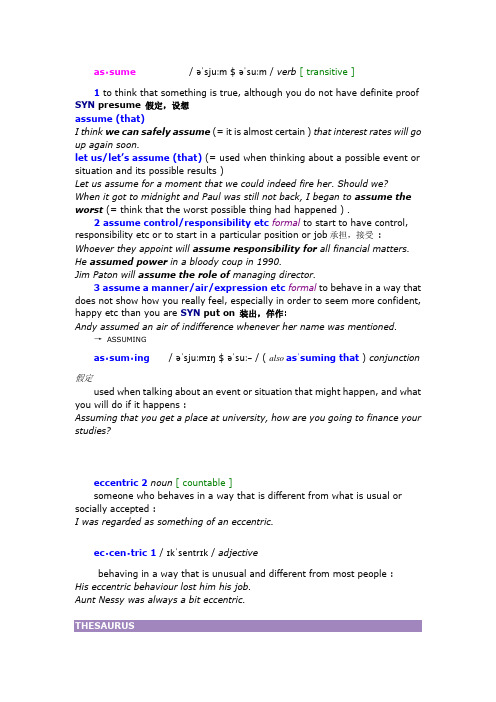
as‧sume / əˈsjuːm $ əˈsuːm / verb [ transitive ]1 to think that something is true, although you do not have definite proof SYN presume 假定,设想assume (that)I think we can safely assume (= it is almost certain ) that interest rates will go up again soon.let us/let’s assume (that) (= used when thinking about a possible event or situation and its possible results )Let us assume for a moment that we could indeed fire her. Should we?When it got to midnight and Paul was still not back, I began to assume the worst (= think that the worst possible thing had happened ) .2 assume control/responsibility etc formal to start to have control, responsibility etc or to start in a particular position or job承担,接受: Whoever they appoint will assume responsibility for all financial matters. He assumed power in a bloody coup in 1990.Jim Paton will assume the role of managing director.3 assume a manner/air/expression etc formal to behave in a way that does not show how you really feel, especially in order to seem more confident, happy etc than you are SYN put on 装出,佯作:Andy assumed an air of indifference whenever her name was mentioned.→ASSUMINGas‧sum‧ing / əˈsjuːmɪŋ $ əˈsuː- / ( also asˈsuming that ) conjunction 假定used when talking about an event or situation that might happen, and what you will do if it happens :Assuming that you get a place at university, how are you going to finance your studies?eccentric 2 noun [ countable ]someone who behaves in a way that is different from what is usual or socially accepted :I was regarded as something of an eccentric.ec‧cen‧tric 1 / ɪkˈsentrɪk / adjectivebehaving in a way that is unusual and different from most people :His eccentric behaviour lost him his job.Aunt Nessy was always a bit eccentric.THESAURUSstrange unusual or surprising, especially in a way that is difficult to understand, or that is a little frightening : What’s that strange noise downstairs? | That’s strange –I’m sur e I left my keys on the table. | a strange old manfunny/odd especially spoken a little strange and making you feel slightly surprised or worried : There’s a funny smell in the kitchen. | It’s odd that you can’t remember him at all.curious especially written strange, especially in an interesting way. Curious is a little more formal than strange : a curious fact | There’s something rather curious about small-town America. | She remembered curious little details. mysterious strange – used about something that people know little about and are unable to explain or understand : He had disappeared in mysterious circumstances. | There were reports of mysterious lights in the sky.eccentric strange in a way that seems slightly crazy and amusing – used about people and their behaviour : He lived completely alone and had some slightly eccentric habits. | an eccentric old ladypeculiar s lightly strange, and different from what you would normally expect –used especially when this is either amusing or worrying : She sometimes wears rather peculiar clothes. | He had a peculiar expression on his face.VERY STRA NGEweird very strange or very different from what you are used to : I had a weird dream last night. | It’s a weird and wonderful place.bizarre extremely strange and different from what is usually considered normal : It was a bizarre situation. | Mark’s behaviour was really bizarre. surreal extremely strange and unconnected with real life or normal experiences, like something out of a dream : His paintings are full of surreal images. | There is something surreal about the climate change talks in Bali. | The plant’s flowers were so big that they seemed almost surrealuncanny very strange – used especially about someone having an unusual ability to do something, or looking surprisingly similar to someone : She had an uncanny knack (= ability ) of putting her finger right on a problem. | Alice had an uncanny resemblance to Josie. | his uncanny ability to pick racing winners hook 1 / hʊk / noun [ countable ]1 a curved piece of metal or plastic that you use for hanging things on →peg :Tom hung his coat on the hook behind the door.2 a curved piece of thin metal with a sharp point for catching fish3 let/get somebody off the hook to allow someone or help someone to get out of a difficult situation :I wasn’t prepared to let her off the hook that easily.4 by hook or by crook if you are going to do something by hook or by crook, you are determined to do it, whatever methods you have to use 不择手段,千方百计地:The police are going to get these guys, by hook or by crook.hook 2 verb [ transitive ]1 to catch a fish with a hook :I hooked a 20-pound salmon last week.2 [ always + adverb/preposition ] to fasten or hang something onto something elsehook something onto/to somethingJust hook the bucket onto the rope and lower it down.o‧blige / əˈblaɪdʒ/ verb formal1 [ transitive usually passive ] if you are obliged to do something, you have to do it because the situation, the law, a duty etc makes it necessaryoblige somebody to do somethingThe minister was obliged to report at least once every six months. Circumstances had obliged him to sell the business.feel obliged to do something (= feel that you have a duty to do something ) Many parents feel obliged to pay for at least part of the wedding.►Do not use oblige when you are talking about a person making someone do something they do not want to do. Use force or make : No one can force (NOT oblige) you to stay in a job that you hate.R EGISTERIn everyday English, people usually say that you have to do something rather than are obliged to do something :He had to sell the business.2 [ intransitive and transitive ] to do something that someone has asked you to do答应(某人的)请求:Would you oblige me by taking this letter to the Director?happy/glad/ready etc to obligeIf you need a ride home, I’d be happy to oblige.3 I’d be obliged if spoken formal used to make a polite request 多谢(请别人帮忙时的客气话):I’d be obliged if you’d treat this matter as strictly confidential.4 (I’m) much obliged (to you) spoken old-fashioned used to thank someone very politely 非常感谢con‧ve‧ni‧ent / kənˈviːniənt / adjective1 useful to you because it saves you time, or does not spoil your plans or cause you problems OPP inconvenient :Mail-order catalogs are a convenient way to shop.My secretary will call you to arrange a convenient time to meet.convenient forIs three o'clock convenient for you?convenient to do somethingIt is simple and convenient to use.R EGISTERIn everyday English, people usually say a good time/day etc rather than a convenient time/day etc:Is this a good time for you to talk?2 close and easy to reach OPP inconvenient :The bus stop around the corner is probably the most convenient.convenient for British English convenient to American English : restaurants convenient for shops and theatres→INCONVENIENTcon‧ve‧ni‧ence / kənˈviːniəns / noun1 [ uncountable ] the quality of being suitable or useful for a particular purpose, especially by making something easier or saving you time :Ready meals sell well because of their convenience.the convenience of doing somethingMost of us like the convenience of using credit cards to buy things.for convenienceFor convenience, the German translation is printed below.2 [ uncountable ] what is easiest and best for a particular personat sb’s convenience (= at a time that is best and easiest for someone ) These meals can be prepared in advance, and served at your convenience.for sb’s convenienceFor your convenience, the bank is open until 7 p.m.Services should be run to suit the convenience of the customer, not the staff.3 [ countable ] something that is useful because it saves you time or means that you have less work to do :The supermarket offers a bag-packing service, as a convenience to customers.a hotel with all the modern conveniences4 at your earliest convenience formal as soon as possible – used in letters :We should be grateful if you would reply at your earliest convenience.5 [ countable usually plural ] ( also public convenience ) formal a public toilet6 a marriage of convenience a marriage that has been agreed for a particular purpose, not because the two people love each other :In the past most royal marriages were marriages of convenience, arranged for political reasons.。
- 1、下载文档前请自行甄别文档内容的完整性,平台不提供额外的编辑、内容补充、找答案等附加服务。
- 2、"仅部分预览"的文档,不可在线预览部分如存在完整性等问题,可反馈申请退款(可完整预览的文档不适用该条件!)。
- 3、如文档侵犯您的权益,请联系客服反馈,我们会尽快为您处理(人工客服工作时间:9:00-18:30)。
acceptancezan赞同。
容忍
anymore再
argument争论,争吵。
论点论据
assistance帮助
assume假定假设
chart图表
conflict冲突,抵触。
战争
connotation含义、内涵
convey表达、传递。
运送、输送
emotional感情上的,情绪上的
emphasis强调、重点
exaggerate夸张
factual事实的真实的
generalization概括。
归纳
ignore忽视,不理
ironically有讽刺意味的是出乎意料的是
literal照字面意思的
literally照字面意思
metaphor隐喻
misinterpret对。
误解,错误地解释
mislead给。
错误印象,使误解
mistakenly错误地
phrase说法、用语
quit离开、辞去。
停止、放弃
react作出反应,起化学反应
rethink再想、再思考
romantic浪漫的、多情的。
关于爱情的。
不切实际的,空想的superlative形容词或副词的最高级
translator翻译、译者
unclear不清楚的
unloving不表示爱的、无爱心的
unsupportive不支持的
unsupportively不予支持地
verge边缘
feel like 感觉好像、摸上去像
for effect为了加深印象、引起注意
lead to 导致、产生
on the verge of 接近于、频于
pull out 拿出、拉出、开到大路上火车驶离车站
take lightly 对。
不重视
accomplishment成绩成就
admirable让人羡慕的
admiration
aura气氛。
光环
brightly明亮地、充满幸福地
cheerfully高兴地
chick小鸡
comprehend理解
determination决心
distinguish区分
dread惧怕
exhaust使精疲力尽
fatigue疲劳
hen母鸡
memorize记住
neglect忽视
over-crowded过分拥挤的
possess占有拥有
postal邮政的邮件的
promising有前途的有希望的
sacrifice牺牲献出
solely独自地、仅仅
surprising
unfamiliarity不熟悉
burst into tears 突然大哭起来
hold back 抑制。
阻碍。
阻挡。
踌躇,退缩。
隐瞒、保守秘密in a different light 从不同的角度,用不同的观点
attendant 服务人员,侍者
bum流浪汉
foreigner外国人
gasp喘气。
喘气说出
highway公路,交通要道
restroom洗手间
takeoff起飞
uncombed为梳理过的,蓬乱的
uncommon不平常的,罕见的
in the end 最后,结果
in the world到底、究竟
pull over把车驶到路边
turn out 结果是、证明是
<PIXTEL_MMI_EBOOK_2005>3
</PIXTEL_MMI_EBOOK_2005>。
